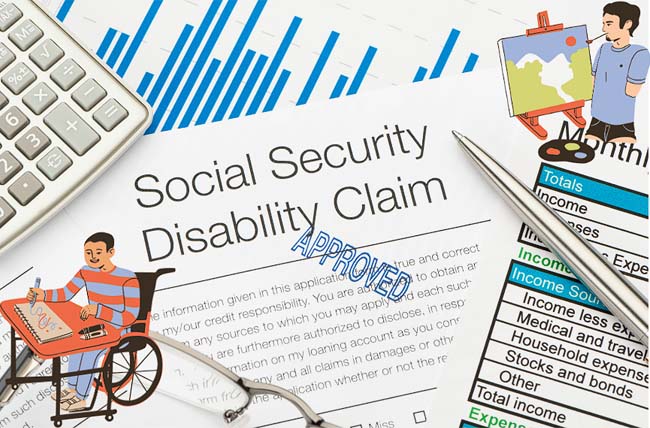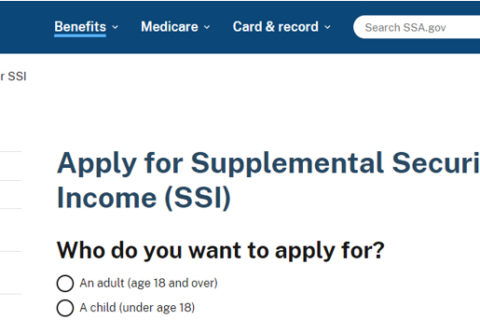For those of you who have filed a disability application, either SSDI or SSI, you may really know how frustrating it was, right?
Depending on how complete your application is, it will take a while until it is finally accepted. It’s so normal if you wait four to six months to get an initial decision. Some people may have to ask for a hearing to fight it, and it could take up to one year.

If you do not want your application to be denied at an early stage, you must be smart about finding out the signs that your disability application is likely to be approved. Thankfully! We’ll show you several promising signs that SSA may approve your application.
Here they are!
Sign 1: You have sufficient work credits
Not all companies and types of jobs provide credit to their employees. Instead, work credits are only available to those who pay social security taxes. They’ll earn one work credit for every $1,640 earned in wages.
The maximum number of work credits you can get per year is 4 credits with a protected income of $6,560. Well, if you have enough work credits, you will qualify for disability benefits.
To be eligible, you must have worked a minimum of five of the last 10 years, and this will depend on your age and the start date of your disability. The following are the requirements based on your age:
-
- If you’re under 24 years old, you must have six work credits in a three-year period.
- If you’re between 24 and 31 years old, you must have 4 work credits equal to half the time you worked between age 21 and the date your disability began. Assuming you got disabled at the age of 30, you’ll need 4 years of work history and 16 credits.
- If you’re between 31 and 42, you must have a minimum of 20 work credits from a ten-year period before the year your disability began.
- If you are over 42, you need a certain number of work credits that are based on a sliding scale and add two credits every two years to the 20-work credit requirement. Assuming you are 50 years old, you need 28 credits to qualify for benefits.
If you don’t have enough work credits, you can still apply for Supplemental Security Income (SSI), but you won’t be entitled to Social Security Disability Benefits (SSDI).
Sign 2: Your medical conditions prevent you from working for one year
Basically, SSA will pay disability benefits if you have medical conditions that prevent you from working for more than one year. If you recover in less than a year and can return to work, you may not qualify for disability benefits.
But if you have to regularly get a doctor’s case, it could be a sign that you’ll get disability benefits, as long as your doctor provides strong medical evidence, such as:
-
- Your medical history
- Diagnostic reports
- Progress notes from your doctor
- X-rays, MRIs, and CT scans
- Hospital stay records if you were ever hospitalized
- Outpatient records of mental health treatment
- description of treatments
- Prescription drug receipts
It’s very important that every medical report is accompanied by documents signed by your doctor that confirm the accuracy of each diagnostic test.
In addition, you may also have a better chance of receiving disability benefits if your medical condition does not get better, such as Parkinson’s disease, multiple sclerosis, or liver cancer.
Sign 3: Your medical conditions meet SSA’s Blue Book
To determine whether your medical condition is severe, the SSA actually uses their Blue Book, a list of medical conditions that qualify for disability benefits. To increase the chances of your application being approved, you can ask the doctor who treats you to confirm that your medical condition meets the Blue Book list.
Keep in mind that it does not guarantee automatic approval from the SSA, even if your disability is listed in the SSA Blue Book. However, an Administrative Law Judge (ALJ) will evaluate your case and give you a court decision to indicate whether or not you qualify for disability benefits.
Even if you’re denied disability benefits, you may still be eligible to get them by proving residual functional capacity (RFC), which prevents you from working, once you undergo medical tests conducted by your doctor.
Sign 4: Your earnings are below SGA limits
You should know that the Social Security Administration (SSA) has its own specific rules regarding individuals who can carry out “substantial beneficial activities” (SGA). Of course, they are not entitled to receive disability benefits.
As of 2023, the monthly SGA limit for blind individuals is approximately $2,460, and for non-blind individuals, it is $1,470.
Those who earn more than the monthly SGA limit are not eligible to receive disability benefits. But if they have earned sufficient work credits and their income is below the SGA limit, they may qualify for disability benefits.
Sign 5: You’re over 50 years old
The Social Security Administration (SSA) will consider your near retirement age when applying for disability benefits. This means that the older you’re, the easier it is to get your disability claim approved since elders are less likely to be hired by employers.
In addition, those who work later in life may find it difficult to learn new skills or adjust to a new work environment. That’s why individuals aged 50 and over will find it easier to receive SSDI claims compared to those who are younger.
Sign 6: You don’t have a college degree, so you’re limited to unskilled jobs
If you have a lower level of education and you have a disability, you may not be able to work in a skilled position even after you recover, so you may win disability benefits. If this is the situation, you must be able to prove that you have limitations to learn any other job.
To make it easier to understand, there are several job classifications based on SSA’s Dictionary of Occupational Titles, including:
-
- Unskilled work: This type of work can be learned on the job in a short time, i.e., less than 30 days. To learn an unskilled job, you don’t need to learn it in school or train for this specific job.
- Semi-skilled work: This type of work requires some skills but only involves simple work tasks. Skills for this job can be acquired in 3-6 months.
- Skilled work: This type of work requires formal or non-formal educational qualifications and experience, so it can help you carry out various complex jobs more easily.
For example, you must have a bachelor’s degree and go to law school for 3 years to become a lawyer. However, knowledge at school is not enough; you have to practice law to gain experience. That’s why lawyers are included in the skilled work category.
If your claim is denied on initial hold and goes to trial, you can provide evidence that your level of education does not qualify for skilled work that is considered SGA. Sure, you’ll get chances to win disability benefits.
Sign 7: You can prove that you are unable to perform your past work
To strengthen your disability claim, you can prove that you really couldn’t do your previous job for more than one year. Apart from that, you also have to emphasize that you cannot even do sedentary work, which is the simplest and easiest form of work, at the following levels of work:
-
- Sedentary
- Light
- Medium
- Heavy
- Very heavy
For this, you must provide your medical records to prove that you have physical limitations in being able to lift, sit, stand, etc. Of course, this is one of the best signs you will make a profit.
Sign 8: You hire a social security attorney
When you have to appeal because your claim was rejected at an early stage, hiring an experienced attorney is a must. Of course, they’ll help you win disability benefits from the SSA.
Your attorney will guide you through the application process, speeding up the results. Most importantly, they will help you gather the medical evidence that the SSA needs to see.
If your attorney is able to handle your case up to and during trial, there are several characteristics that make you likely to qualify for disability benefits. Here they are:
-
- The judge asks you, or your attorney, several questions. This is an indicator that the judge believes your medical evidence and simply wants to ask you if there is any work you can do.
- The judge who determines the decision has a high level of respect. Of course, they will be professional in carrying out their work so as to give you a fair decision.
- The judge issues a judge’s decision at your disability hearing. This is the only valid sign that you are truly approved to get disability benefits.
Okay, those are a few eight signs where your claim is actually approved, so you’ll have a bigger chance to obtain your disability benefits if your medical condition prevents you from doing your old job as well as your new job.

A bookworm and researcher especially related to law and citizenship education. I spend time every day in front of the internet and the campus library.




